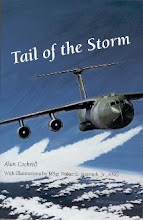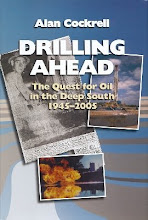Trouble
is often an ephemeral presence that visits you, wreaks some measure
of havoc, then pretends to go away. You
attribute its apparent demise to your skill and cunning in dealing with it, but it
only hides nearby and snickers at your naivete.
And
that's precisely what it did when we successfully avoided the
embedded thunderstorms north of Aruba. And did so, as you recall,
with all our radios succumbed to a bout of mysterious, chaotic static
during which we could hear nothing. After dodging the storms we
needed to re-establish our course to Aruba. The 180 vacationers on
board were eager to get to the beach.
Beatrix
Control, on Aruba, had finally broken through the static and saluted our deviation around the storm (it was to be done with or without their approval), but their answer to our next question
gave us a hint of what lay ahead. Chris asked for clearance direct to
AUA, the Aruba VOR station which is located on the airport. The
thickly accented Hispanic voice said, “Roger.
“Roger”
is not a clearance to do anything. It only means “I understand
you.”
Chris
asked again, but the man was busy with planes arriving at Aruba ahead
of us. We were headed southwest toward nothing but blue water. After
repeated tries to get a clearance resulted only in a string of
“Rogers,” I turned south to AUA.
The
thunderstorms receded behind us but multiple broken cloud layers partially veiled the island. Then welcome but
puzzling news: Beatrix asked if we had the island in sight. We had
only a piece of it in sight. The weather, though not below VFR, was
unusually bad for Aruba, consequentially you would expect an
instrument approach would be in order.
Chis
reported that the island was in sight. The only response was—you
guessed it—“Roger.” So we continued inbound to AUA.
Aruba
usually lands east into the prevailing Trade Winds, but that day the
winds were westerly, and the only approach to that runway was a VOR
approach. We don't do those often, but we're trained for it. A VOR
approach would be okay. As we tracked inbound to AUA we set up for
it.
Through
thin, misty clouds, I saw the north coast with its string of resort
hotels—most of our passengers' destinations—slide underneath our
nose. Our course ended only a few miles ahead and we were hanging at
6,000 feet with no further clearance. Chris appealed for a clearance
but none came. Logic and experience suggested we would be issued
radar vectors to the final approach course at the VOR. But logic does
not always prevail in some parts of the planet.
The
VOR and the airport upon which it sat slid underneath us. Chris and I
looked at each other. He shrugged. I decided to hold the inbound
heading. It seemed logical that we would pass overhead the airport
and turn east for a left downwind to runway 29. But, there was that
silly logic thing again. Shouldn't be thinking that way.
As
we headed out south over the water Chris finally got Beatrix's
attention. “How far south are you going to take us?” he asked.
Their
response was, “Say your radial and DME from Aruba.” He told them. Their answer? You know.
Not
good. Obviously they didn't have us on radar and, worse, they weren't
admitting it. They resumed talking
to other aircraft, while we cruised southward toward the Venezuelan
coast. I got jumpy. This couldn't go on. That was dictator Hugo Chavez's territory ahead and it was getting bigger by the minute. Chris called them
again, and again they asked our position.
I
knew we could get intercepted if we violated Chavez's airspace. His
fighters would force us to follow them to Venezuela, he would make a big media deal of it and Chris and I
would spend time as guests in his jail. I weighed the options: Clearance deviation (with
small possibility of mid-air collision), or Venezuelan jail (with
large probability of abundant misery).
The decision took about a nanosecond.
I turned east.
We
carefully watched the TCAS scope and kept our eyes searching for
conflicting traffic. I saw the island off the left side. Beatrix
asked us again for our position. When Chris gave them the information
and told them we were eastbound, they told us to report on a 10 mile
final for runway 29. FINALLY, A PLAN!
We
looped around to the west and tracked inbound on the VOR approach.
Just as the airport swam out of the gloom two miles ahead, the tower
cleared another aircraft for takeoff. The guy was slow to take the
runway. The last thing I wanted was a go-around under the conditions
of marginal weather, bad radios, no radar coverage and people
controlling us who were only pretending to control us. The guy lifted
off just as we touched down. I've never seen it that close even at
Chicago.
We
turned off, found our gate and shut down. I slumped back. Chris said,
“Can you believe those guys? They had a radar outage and didn't
even tell anybody!”
Yep.
I could believe it.
Ever
heard the old expression, Never stop flying a tail-dragger until
you tie it down?
Same goes for a 757—especially in Latin America.
Answer to last post's puzzle: Anonymous nailed it.
Same goes for a 757—especially in Latin America.
Answer to last post's puzzle: Anonymous nailed it.
How about this for an office window view?







